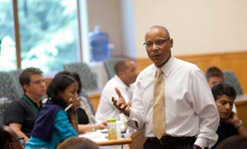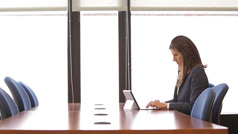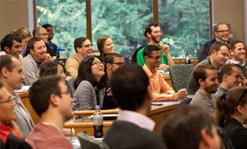Meet Our Fellows: Youssouf Ntambi T’21
February 3rd, 2021

Name
Youssouf Ntambi
Hometown
I’m originally from Rwanda, but Kampala, Uganda is “home” to me, and I have spent most of my professional life in Nairobi, Kenya.
What did you do prior to Tuck?
I worked in Private Equity in Nairobi.
Why did you choose Tuck?
My former boss was a Dartmouth undergraduate and also had his MEM from Dartmouth. Throughout my career, all of my bosses had their MBAs. The boss I admired most was a Tuck graduate, and a major reason I considered Tuck was because of him. He embodies the “wise leader” that I aspire to be.
Do you have any post-Tuck plans yet? If so, what are they?
After graduation, I will be returning to Barclay’s in New York, where I spent my internship. I’ll be joining the Communications and Media group.
In the long term, I am considering going into early-stage investing, with a focus on tech-enabled industries in Africa. Right now, I’d like to learn as much as I can this side of the Atlantic, understand how the industry works, while building a network that will support my long-term goals.
What made you want to be part of the CDS MBA Fellows Program?
I’m a big fan of the technology sector and the impact and influence it has across industries. Never before have we witnessed a sector (technology) that has eaten up other sectors the way tech does. I believe that the Center for Digital Strategies is the best place to learn and understand the US tech industry. At home in Africa, I didn’t have as much exposure to the movers and shakers of the tech industry. The breadth and diversity of speakers I have been able to learn from, as well as learning from my peer CDS Fellows, are some of the highlights of my time at Tuck thus far.
What is the best part about being involved with the CDS?
The conversations I get to have with my peers and the speakers we’ve had. I love having a place where everything is viewed through the lens of technology, and I can’t imagine I’ll ever get tired of it. It’s a great bubble to be in!
What other activities are you involved in at Tuck?
I am the co-chair for the Tuck Africa Club. I am also a fellow with the Toigo Foundation, whose mission is to bring underrepresented groups into finance in the United States.
What has been the biggest growth moment or moment where you stepped out of your comfort zone? What did you learn from that experience?
My First Year Project (FYP) was a huge growth moment for me. I worked with a startup, focusing on commercializing their product. It was a promising product, and my team worked with them on market research, GTM strategy, and pricing. The work was really interesting, but I was challenged over the course of the FYP in a number of ways.
First, I was the group leader, responsible for coordinating our team based on our different strengths and backgrounds. I also was in charge of liaising with and coordinating our work with our client.
Secondly, as anyone who has managed a team and a client knows, aligning deliverables to client expectations can be challenging. On top of that, everyone (my team and the client) was transitioning to remote work, which presented a new, unfamiliar layer of responsibility to the project. Working across multiple time zones (including a 12-hour difference with China) took some adjustment, too.
There were definitely growing pains at the beginning, both from the student and client side. I knew the rocky start was weighing on my classmates, and as the leader, I knew it was my job to boost morale, and with constant support and enthusiasm, we pressed on, bridged early divides, and ultimately delivered what we set out to do for our client.
It was eye opening to see just how much we were able to apply from our classroom learning directly to the project.
What speaker(s) have you learned the most from in your time at Tuck?
Trip Davis T’90, who I had for an entrepreneurship class, spoke to us about his journey as an multi-venture entrepreneur. I loved learning about how he went about market discovery and raising capital, in particular.
Another speaker that stands out to me is Alix Peabody D’12, founder of Bev canned wines. I appreciated her honesty about her entrepreneurial journey. So often we only hear about the glamor and success of startups, but she was very candid about her ups and downs, and failures. Her energy was infectious, too, which is always appreciated.
What books are you reading, podcasts are you listening to, or shows are you watching?
I like to read many books at once…I usually have 5 going simultaneously! I just finished Post Corona by Scott Galloway. It looks at what COVID-19 has done in terms of digitization and how it has created “dispersion” in so many industries, while accelerating long term trends such as digitization. Who are the winners and losers? Where are the opportunities?
I am also reading The Business of Platforms, which explains in depth how platform businesses work, breaking them down into innovative platforms and product platforms.
Another book that I’m working my way through is on the Punic Wars between Rome and Carthage. I’m fascinated by history, especially war histories, because they challenge the reader to wonder how they would react under such pressure.
Finally, I’m reading Alchemy of Finance by George Soros. In Alchemy of Finance, Soros rebuts the theory that markets are a one-way relationship (for example, “Doing X affects market prices by Y.”) His theory of reflexivity views markets more as a two-way feedback loop, which I find really interesting.
Moving on to Podcasts, I have a few favorites:
- Patrick O’Shaughnessy’s podcast “Invest Like the Best” is really informative and fun. He interviews investors and entrepreneurs, including the founders of Stripe, Plaid, and Shopify, to name a few. He tries to get to the core of how people think of problems and specific go to market strategies for their products.
- “Masters in Business” by Bloomberg’s Barry Ritholtz interviews leaders in different fields like financial services and entrepreneurs. He tries to glean a better understanding of how people think about leadership.
As an international student at Tuck, what thoughts or advice do you have for other students around the world who are considering business school, especially Tuck?
When you’re coming to the US from far away like me, remember that you are going to be far removed from familiar places and cultures. I recommend international students try to have as many discussions as they can with people who have been at Tuck recently, and have since graduated.
Talking to someone who has “been there,” graduated, and is now working will really help you put your MBA goals into perspective, as well as help you find out if a certain school is right for you. Speaking to people who now have a few years of post-MBA work under their belt provides certain perspectives on their MBA experience that they may not have had while still in school, and I’ve found those types of conversations to be very valuable to me. It also provides a great opportunity to ask them how they’ve navigated entering Corporate America, which many international students want to do when they graduate but have never done prior to business school. Also, if you have the chance to visit your prospective schools, do it!







